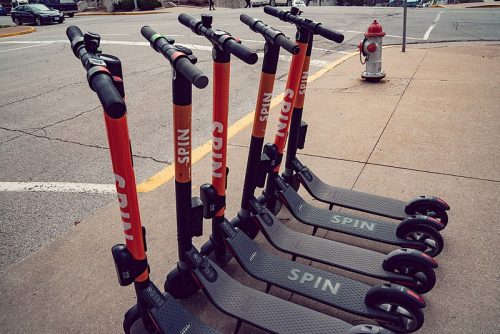
From being thrown underwater to traveling short distances, e-scooters have been popular in Portland since the city brought them in. Now Eugene is in the early stages of inviting e-scooter companies to the city as a way to curb carbon emissions.
“The e-scooter industry has matured to a point where the city is ready to invite companies to bring their products in,” says Rob Inerfeld, Eugene’s transportation planning manager.
The city first has to change city code, which doesn’t allow e-scooters on multi-use paths, he says.
Before the Eugene City Council hears a presentation from the city officials about e-scooters, staff will hold a public engagement period through a survey on the city’s webpage Engage Eugene, Inerfeld says.
The use of e-scooters is part of the city’s overall climate action plan to curb carbon emissions. In this case, encouraging people to use e-scooters for shorter distances, a transportation strategy called micro-mobility.
In January, Good Company, a Eugene-based consultant, conducted a greenhouse gas inventory of Eugene. In 2017, the largest source of community emissions was passenger and freight transportation, at 53 percent.
Because the city is using e-scooters to offer a low carbon option to encourage less driving, Inerfeld says part of analyzing e-scooter companies’ fleets is to find out what their average life-cycles are. Sustainability is a big part of the program, so an e-scooter with a short lifespan can make its carbon footprint large, which defeats the purpose.
Inerfeld says the plan is to have a pilot program start in spring. He says he doesn’t think that’s too fast of a timeline. The city is more measured in approaching the e-scooter program than other cities that have invited e-scooter companies without much planning, he says.
In 2017, two e-scooter companies, Bird and Lime, brought e-scooters to 43 markets without the local governments’ consent, forcing officials to fire back with cease and desist orders, according to a 2018 report by Portland Bureau of Transportation..
That PBOT 2018 report is the most recent look at the city’s e-scooter program. The report found that 34 percent of Portland riders and 48 percent of visitors used e-scooters instead of driving or using a ride-hailing service — like taxis, Lyft or Uber.
Inerfeld says Eugene is looking to Portland’s use of the technology. Portland is in a yearlong e-scooter pilot program, which ends in April.
The city will also decide how to charge fees — whether through permits, licenses or e-scooter fees — to offset any costs the city faces in overseeing the program.
After the City Council approves any city code changes, the next step is to request e-scooter companies to submit applications. From there, the city will score applications based on criteria partially crafted by Eugene residents.
A company might score higher with a low-income option, allowing borrowing without a smartphone and having e-scooters with a seated option for accessibility.
E-scooters won’t be the first ride share program to come to Eugene. PeaceHealth’s bike share program shows a demand for mobility transit options, Inerfeld says. The city could have as many e-scooters as there are PeaceHealth bikes, he adds.
To participate in the city’s survey on e-scooters, visit Engage.Eugene-Or.Gov.